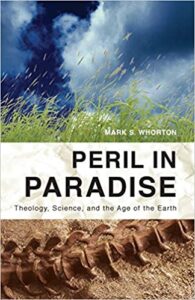Was God’s Original Creation Perfect?
There is, and probably always will be, a debate going on between sincere Christians about the age of the Universe. I think I’ve made my position on that issue very clear. But at the core of the disagreement between the so-called “Old Earth” (OE) and “Young Earth” (YE) Creationists is their respective views of “Death before the Fall” of Adam and Eve. I fully understand the stridency on the side of my YE friends in this regard. After all, this topic is vitally important to our understanding of the entire plan of salvation. But the YE paradigm insists that the original creation was a Perfect Paradise in every way. I think they’re dead wrong about that. And my reasons are theological. Was God’s original creation perfect? I think it was. But not in the way my YE friends insist it was. It wasn’t a perfect paradise, free of death and suffering. But it was perfectly designed to achieve God’s eternal purposes. That’s a far different thing.
The Meaning of God’s “Very Good” Decree
At the center of this debate is what God meant when He declared His creation to be “very good” in Genesis 1:31. On the YE view, there is no room for interpretation of this phrase. The reasoning is straightforward. Death isn’t good. And if you think the Earth had been around for a few billion years before Adam & Eve showed up, the obvious implication is that there would have been a whole lot of “death before the fall.” God would never have created such a place. He certainly wouldn’t have called it “very good.”
Even worse, if there was death before the fall, that seems to negate the very reason that humanity needed a Redeemer. Romans 5:12 states very plainly that “… sin entered the world through one man, and death through sin …” In other words, there was no death before the fall of Adam & Eve. To say there was is to ultimately negate the very reason for which Christ had to die on the cross!
This is a big problem that needs to be addressed. I get it. And that’s why I am empathetic to the objection to an old universe with lots of death before the fall. We have to be very clear and careful about how we approach this issue.
The “Perfect Paradise Paradigm”
To do that, we should first look at a summary of the YE position. In his book, Peril in Paradise (available below), author Mark Whorton lays out five basic tenets of what he calls the YE “Perfect Paradise Paradigm.”
- When God declared His finished creation “very good,” He meant that it was perfect in every conceivable way.
- Eden was the embodiment of the Creator’s ideal intent for His creation.
- Man’s sin thwarted God’s plan, shattered His ideal intent, and ruined all of His perfect creation.
- God introduced the physical death of man and animals as a punishment for sin.
- God instituted the plan of redemption to reverse the effects of Adam’s sin and restore all things back to their original intent.
This is an outline of the view most of us have probably learned about the Garden of Eden in Genesis 1. I know it’s what I was taught. But the more I’ve studied the issue, the more I found it wanting.
Problems With A Perfect Paradise
To be direct, the first point in the list above is obviously false. The creation was not perfect in every conceivable way. I say this for a few reasons …
- Satan was in the garden
- The garden contained the “Tree of the Knowledge of Good and Evil”
But 1 Corinthians 2:9 tells us that, “No eye has seen, no ear has heard, no mind has conceived what God has prepared for those who love him.”
If that’s the case (and I believe it is), the Garden of Eden could not have been a “perfect paradise.” Not if something far better is coming in the future. And there’s more:
- Adam was always required to tend to the Garden — the fall did not impose that work on him, it just made his work more difficult.
- The curse on Eve did not originate the pain of childbirth, it increased the pain she would experience.
For each of these reasons, it seems pretty clear that the garden could not have been a place of “absolute perfection.” Satan, and evil, and pain cannot exist in any place that God says is “perfect.” But there is an even more obvious problem with this notion of a perfect paradise.
Words Mean Things
The more obvious problem is right there in the words. In fact, the problem is so obvious it’s hard to imagine how it ever became an issue in the first place. God said that his creation was “very good.” But …
“Very good” does not mean “perfect.”
The Hebrew phrase translated as “very good” here is: meod tob. This phrase occurs elsewhere in the Bible. But Genesis 1:31 is the only place in Scripture where some have interpreted it to mean “absolute perfection.” Why would that be?
I submit it is because we have been taught to assume the YE paradigm is true. And if it is, the Perfect Paradise Paradigm also has to be true.
I don’t know how else to put it.
Perfect Paradise Assumptions
No doubt, the Garden of Eden was a unique and specially protected place that defies our imagination. But the flaw in the Perfect Paradise Paradigm is that it assumes these conditions also existed outside the Garden. Think about that for a second. Why would the Garden need to be specially protected if the entire creation around it was also “perfect?” Secondly, where is the Scriptural evidence to support the idea that the entire Earth was a perfect paradise?
It is nowhere to be found.
There are several other logical difficulties that stem from this idea. And they are not trivial.
Animals Cursed by Death
The Perfect Paradise Paradigm demands that there was no death of any kind (including animals) before the fall. It insists that death only invaded the perfect paradise when God imposed it as a penalty after the fall of Adam & Eve. But, once again, this idea is foreign to the text. Look at Romans 5:12 again. It tells us specifically that death was imposed on “all men.” It doesn’t mention anything about animals, or anything else in the creation. Those who defend the Perfect Paradise Paradigm always quote the beginning of this verse to make the point that ” … sin entered the world [through one man], and death through sin.” They rarely acknowledge the remainder of the verse that specifically states “… and in this way death came to all men.”
My point is simple. There could well have been death in the plant and animal kingdom outside the Garden before the fall of man. Nothing in Scripture prohibits it. The only critical issue regarding death is that it was a penalty God imposed on human beings who willfully rebelled against Him. As human beings are the only moral agents with free will on the planet, it is only human beings who received the penalty for violating God’s moral law.
Carnivores
It’s pretty obvious that for animals to eat, other animals must die. But if the world was a perfect paradise with no death, it follows that there could not have been carnivorous activity either. In other words, all the animals that we now recognize as carnivores must have been herbivores before the fall. The perfect paradise model insists that these animals all changed their “behavior” by “degenerating” into carnivorous activity after the fall.
But, as Mark Whorton points out, there are enormous differences between carnivores and herbivores.
“Carnivorous digestive systems are fundamentally distinct from herbivore systems. Herbivores are able to digest the cellulose that forms the cell walls of plant while carnivores are not. Carnivores can survive without a stomach. Herbivores cannot. Carnivores can survive without microorganisms; herbivores cannot. Carnivores can survive without plant food. Herbivores cannot.”
A carnivore like a lion is a finely-tuned eating machine that is built with specific instincts, musculature, anatomy, physiology, and biochemical makeup. These are fundamentally different animals than the herbivorous creatures that would have existed prior to the fall under the Perfect Paradise model.
Defense Mechanisms
Other creatures like the bombardier beetle have always been favorites of creationists (of all stripes) because of the incredible design they exhibit in their ability to defend themselves. But why would such a creature need to defend itself before the fall if there was no death or violence to threaten it? Did a porcupine not have quills, a skunk not spray, sea urchins not have spines, or did snakes not have venom and fangs? The list of preposterous suggestions goes on and on. The design of these creatures makes no sense if they originated in a world without threats or danger.
Immune Systems
According to the Perfect Paradise Paradigm, there would have been no need for immune systems in animals because there was nothing to threaten them. Living things had nothing to fear from death through disease. Yet, these kinds of systems are highly sophisticated and built into the physical makeup of every living creature. They depend on specific physiology and use the energy resources of the body in a very integrated way. Did these systems just spontaneously appear after the fall?
Extreme Habitats
There are countless examples of organisms of all kinds that are specially adapted to the environments in which they live. Not only so, but these are parts of larger ecosystems that are also specially designed to support the food chains of their inhabitants. In a non-threatening, perfect paradise this makes absolutely no sense. If the entire planet was one giant, perfect ecosystem, there would be no need for any creature to be specially equipped to survive in its home environment.
The Most Troubling Implication
There are plenty more examples. And all of these are fatal flaws for the Perfect Paradise Paradigm. But there is one aspect of this way of thinking that is more troubling than anything we can observe in nature.
The most harmful aspect of the paradigm is the way it sabotages the sovereignty, omniscience, and character of God.
The Perfect Paradise Paradigm implies that God created what He thought was the perfect world for humanity to enjoy. He intended mankind to live pain-free in that world forever. But we humans shattered the perfect world He had created. Worse, God never saw it coming. He was caught off-guard. And when mankind threw him the ultimate curveball, God was forced to react. He had to institute a new plan of redemption to return the creation to the way He wanted it to be.
Human sin thwarted God’s intended purpose for the creation and forced Him to invoke Plan ‘B.’
Really?
A Better Understanding
There is a better way to understand all this. Mark Whorton calls it the Perfect Purpose Paradigm. On this view, the Garden of Eden is still a special, protected place. But being protected implies there was something it needed protection from. The lack of death inside the Garden is what made it special. The world outside the Garden was dangerous. But it was designed in exactly the way God needed it to be to achieve his ultimate purpose.
On this view, the incredibly integrated design we see in nature today was not the result of some Plan ‘B’ reaction on God’s part. God didn’t have to completely alter His original creation because of something we did to screw it up.
In His perfect omniscience and foreknowledge, He designed the world to be this way. He knew exactly how He would use it to serve His purposes when the time came. Where the Perfect Paradise view insists that suffering and evil defy God’s intentions, the Perfect Purpose view recognizes their place in the story.
Ironically, if Eden was the perfection God originally intended there would be no need for a Redeemer. But that’s why the Perfect Purpose Paradigm is a more accurate view of reality.
The Perfect Purpose Paradigm
We don’t know why, but evil pre-existed the creation. The rebellion of Lucifer and his minions played a part in it all. And God’s purpose in creating the world was to defeat that evil forever. Suffering and evil are part of the creation. But God allows them here for a little while as compared to eternity. They are part of what God uses to accomplish His eternal purpose. We can see how this plays out throughout the Bible in the lives of Job, Moses, Pharaoh, Abraham, Isaac, Joseph, the nation of Israel, Paul, and, yes, even Jesus.
Under the Perfect Purpose Paradigm, God’s labeling the creation “very good” is a value judgment about the where and why of His eternal plan. On this view, “very good” means “perfectly suited to the purpose for which God intended it.” It makes more sense of the words of Scripture. And it aligns more with the reality we see in the world around us.
The destination is much more wonderful than our ability to enjoy this life alone. He designed the world to allow His image-bearers to experience darkness and evil so that we would hate it as much as we should. As much as he does.
As free-will beings, our mission, should we decide to accept it, is to choose to reject evil, thereby drain it of its power, and join with God in defeating it for good. And those — His church — who choose God over evil get to spend eternity with Him.
The real purpose of it all is for us to glorify God forever.
Our Ultimate Purpose
God’s plan of redemption is not a Plan ‘B.’ It was not instituted as a reaction to our unforeseen rebellion. Instead, it was the plan for God’s perfect purpose from before the beginning of time.
Suffering and evil are here for a little while. They serve only to lead us to accomplish an eternal purpose. That purpose was not to create a perfect world. It was to perfect us so that we would be worthy of spending eternity with God.
To answer the original question, God’s creation was indeed perfect. But it was perfect in a different way than most of us have been led to believe. It was perfect because it was built to prepare us for glory in the new heaven and new earth.
That’s a perfect end. And that’s how God has always intended it to be.
Order Mark Whorton’s book, Peril in Paradise here:







I had never heard this OE viewpoint, but I agree that the Bible doesn’t tell us the actual age of the world. The Bible does tell us that someday wolves, lions & leopards will no longer be carnivores (Is 11:7 & 65:25), so I think it’s a reasonable possibility that these animals weren’t carnivores in Eden. (Ez 36:35) The Bible also says in Romans 8:20-23 that animals are going to undergo some sort of change, and it sounds like their suffering will end. I believe, based on Romans 8:20-23 that animals and perhaps plants are going to go to a paradise of some sort.
God has given animals the ability to evolve within their species, as needed, in hopes of surviving in this fallen world. Maybe they weren’t evolving in Eden?
This is my answer to myself & others who wonder why innocent animals have to suffer. I don’t have an answer for why innocent babies & toddlers suffer, but I believe, based on 2Sam 12:23 that they go straight to heaven.
Thank-you for another interesting article.
One thing to note about the Isaiah passages is that it refers to “in my holy mountain“. Within that very narrowly defined area, there will be straw-eating carnivores. It does not seem to me that it will be a universal thing. Can you imagine rabbits multiplying without limit? Within a couple decades the entire earth’s surface would be covered over a mile deep.
I agree with you on one point only:The person(s) that are YE and say that God created a perfect paradise are mistaken. They are mistaken on the premise of it being a perfect paradise not necessarily wrong believing in a YE. You have thrown the baby out with the bath water by insinuating that because they believe in a perfect paradise they are wrong about their YE view.
Your whole thesis presumes this logical fallacy.
No where in God’s word does He say His creation was perfect just as He has never given any evidence of “billions of years – gaps between days or any other evidence other than seven literal twenty-four days and the being created on day one before the sun and moon. Any other presuppositions made from His clear communication of what He wanted us to know about His creation is mere speculation based on a worldview influenced by mans word and a false narrative of what science supposedly says. Science says nothing about science only “scientists” do. There are two types of “science” historical, which, since no person alive was there to witness the events; consequently any conclusions presented are again mere speculation.
The second type is the one we are familiar with and that is observational science; one in which we can use the scientific method to examine and validate out theories of the evidence offered us.
I would also suggest your use of uniformity in some of your conclusions cannot be substantiated: that everything from the beginning was as it is now. We make conclusions of the past based on what we observe now. All animals adapt to their environment as needed to survive.
Along this same line you have missed all the scriptures that tell us that man and the animals ate only plants and that God did not permit the eating of meat until the time of Noah.
To get to the point of my comment you are missing the critical element that I feel, is a logical and reasonable explanation for this conflict. It answers the question of why “very good” vs, “perfect’, and others such as why the tree of “knowledge of good and evil” existed in the garden, as well as why Satan was there.
God, at the time of creation God , I believe scripture shows us, that He did not want to create a world of robots that would be nothing more than perfect, corporeal, obedient slaves. So He gave us CHOICE so that we could or could not be obedient.
I say this to say that one day we will be with Him in a perfect creation where the lion will lay down with the lamb and there will be NO more sin. The time for choosing will end with Christ’s second coming and everything will be judged based on the one thing that made the first creation “very good” and the second “PERFECT”
Your brother in Christ
Thanks for your thoughtful reply. But I do take exception with your claim that I have thrown the YE baby out with the “perfect paradise” bathwater. I think it’s the other way around. YE proponents insist that the “perfect paradise paradigm” requires the YE position to be true because there could be no death before the Fall. You seem to agree that the “perfect paradise paradigm” cannot be true. That’s all I’m saying … that it undermines one of the premises of their position. But I don’t reject the YE view for that reason. I reject it because I see no other evidence to support it.
You write, “We don’t know why, but evil pre-existed the creation.” There is no Biblical justification for believing that, nor is it necessary theologically.
Evil is not eternal, it is that which is contrary to God’s character or will. Lucifer, like every other created being, was just that -created. When he chose to exalt himself -contrary to God’s will and nature -he acted evily. Likewise, Adam and Eve, and we when we sin, fall short of God’s glory. This falling short of God’s glory = acting contrary to God’s will and/or character = evil.
Unless Christ returns first, we will one day die. But death will also one day day, swallowed up in victory. That which dies is not eternal. This in part is why God raised Jesus from the dead, because it was not possible for death to hold Him -He IS eternal and has conquered death.
I didn’t say it was “necessary theologically.” But there most definitely IS biblical justification for it. It’s in the text! As I said in the post, Satan was in the Garden — a garden which contained a “tree of the knowledge of good and evil.” That means both had to exist before Adam & Eve inhabited the Garden. I’m not sure how you get around that fact.
Maybe I should be more clear on what I mean by saying “evil pre-existed the creation.” By that, I mean the physical universe that is created ex nihilo in Genesis 1. The implication to me is that Satan and his minions rebelled (and therefore instituted the reality of evil) before the Genesis creation account. I know it’s conjecture, but that leads me to believe that’s WHY God chose to create — to use free will beings as his chosen method of defeating evil once and for all.
Also, I never said evil was “eternal.” I’m not sure why you’re making that point. It’s not really relevant to the theme of the post.
Original Creative acts of God were perfect. Are perfect. Genesis 1:1 God created the heavens and the earth.
Yet verse 2 says the earth “was”formless and void. How can these two realms of creation confirm God created an imperfect earth only to have to
Inturn make it good or in other words perfect. It was made perfect it was destroyed by God and became desolate and dormant. Then God came at a later time and restored it. Thus the remake of restoring life to the earth. Thus making a functioning livable world. So in the beginning God created the heavens and the earth. But, from Genesis 1:2 and on through the remainder of Genesis chapter 1 everything that took place was restoration. Every thing God did was reviving everything the earth already previously possessed. Literally everything that God did was making everything that already existed in the ground. He ordered it to come forth which was already there in the ground. This was pointed out in the Greek Septuagint “He made” from what already existed. Two quotes: “And was” past tense which means before restoration it already existed! So everything God did to the earth in restoration was the word “MADE” not created. Creation was already done. When God brought light to the earth it was because it was in a state of darkness. When God made Adam it was from the dust of the ground! When God made Eve it was from a rib of Adam.
On the 4th day of restoration God “made” the Sun Moon and Stars. Genesis 1:1 is literally a statement of everything God Created. The material objects that were already in space (Universe) were existing. On the forth day of restoration He God gave the sun moon and stars functionality and purpose from material he had already created. When Michael Angelo carved out King David from stone he “Made” David’s image. He did not Create it. So:
By understanding and observing two words you’ll learn that
“Create” and “Make” have to be differentiated and separated to understand God’s work in everything that exists! One note:
Remember one thing that proves that the earth was originally perfect and livable with plant animal and human life. God said to Adam and Eve……..be fruitful and “replenish” the earth! Why because the already existed before Adam and Eve. With what I’ve explained God gave me the understanding of our beginning
and our world. (He gave me the gift of discernment) And the functioning Universe which is all here for the angelic and human beings he produced.
The easiest & most logical solution is to just ignore the God Hypothesis & follow what powerful, explanatory, & predictory science has shown us about reality that we’ve never known by any other means before science.
It seems like you believe that “ignoring the God hypothesis” somehow solves the problem. Nothing could be further from the truth. The point of this post is an explanation for the origin and nature of evil. No matter what your position is on the existence of God, no one can deny that evil exists. But trying to understand its origin is not only more difficult without God, it’s impossible.
But one thing is for sure. Science has absolutely NOTHING to say about the origin or existence of evil.
I think if you are consistent in your Biblical interpretation, you should look at YOM the way you look at “very good”. Yom, when used with ordinal numbers, always refers to 24 hour days in scripture. I agree with your distinction of purpose vs. paradise distinction up to a point, but I am not sure your “purpose” argument is well defined enough and it doesn’t necessarily need to include animal death. God knew how long it would take Adam and Eve to fall, he didn’t have to adjust the plan. It is reasonable to think that the types of creatures created had the necessary genetic and anatomical features to live in both a pre and post fall world and that extinction and adaptation (not evolution) have given us our current types and species. But my original argument centers around a consistent interpretive principle and the hebrew word “yom” that had ordinal number and is modified by day and evening (since no one had an apple watch yet)
Thank you for this site, lots of great stuff here.
While I disagree with your assessment, it’s a reasonable position to take. I guess I have a hard time believing that what is now a straight-up hunter-killer carnivore like a tiger somehow changed its stripes (pun intended) after the fall. Most importantly, I don’t see how you get around God’s having to resort to Plan ‘B’ when his perfect paradise got corrupted. And, even if I agree to the definition of ‘yom’ you’re defending, it doesn’t change the fact that an honest evaluation of the evidence suggests the universe is 13.5 Billion years old. Maybe the creation days were 24-hour days with millions/billions of years in between? That would be the compromise position but it just doesn’t seem realistic to me — especially when there is no theological necessity for adopting that view.
Anyway, thanks for the thoughtful comment, Corey. Unfortunately, polite discussions of this topic are far too rare. So, I appreciate you taking the time to comment and that you’ve done so respectfully.
Blessings, brother …
Mark 10:18 “Why do you call me good?” Jesus answered. “No one is good—except God alone. The rich young ruler approached Jesus and asked, “What good thing must I do to inherit eternal life?” Jesus answered, “Why do you ask me about what is good? There is only One who is good.”
The Scripture verse above proves that when GOD said that His creation was “very good” He meant that He created it to be perfect just as He is perfect. The word “good” can not be a term to describe something less than perfect if it is a word used by Christ to describe GOD
Very interesting article. I teach for a major Christian university and for some time I have been communicating my views that the creation was not perfect. But I say this for a different reason. Only God is perfect. I like the idea of a perfect plan because his plan is perfect. But the way I have seen this is that the creation by necessity cannot be perfect because it is created. If the creation was perfect, it would lead us to pantheism. Adam and Eve were not perfect at creation because they did not know all things as God does , perhaps this is an extreme view of the idea of perfection, but it seems logical to me. Adam and Eve were potentials and were not fully actualized in perfection like God is. This kind of goes back to the old Neo platonic idea of the chain of being. In a world that is in God‘s perfect plan, but created as very good and not in absolute perfection, there will be mistakes, earthquakes, volcanoes, natural disasters, and all kinds of natural evils. There will be broken legs, there will be sickness or potentially sickness. These are my ideas, and I would really love some comments on this. Thank you, Randy Weisberg .
Seems we are all parsing words – perfection vs very good. Yes God apparently made a world where sin (and its resulting corrupting consequence) was possible … (in order that redemption could showcase the insane depth of His sacrificial love and elevate us from mere creatures to adopted children). But I certainly don’t consider a world where lions tear apart lambs and volcanoes wipe out chicks and puppys as “very good”. Not terribly convinced that God created a very good deterorating world “waiting to be delivered from its bondage to decay” (Romans 8:20) … so if the decay was prior to and not as a result of a historic “fall”, then there needs to be another explanation … I suppose one might conjecture the fallen angels played a role, but I dont see that explanation in the Bible. Not sure the relationship between Genesis 1:1 and 1:2 so not sure the Bible says how old the earth is. Though we were created to explore the creation, “mainstream science” silences opposing views. Yesterday’s science is now discarded. Today’s science will be discarded tomorrow. We were not there at creation and we actually have no idea how old our planet actually is.
Thank you so much for this article! Very few seem to engage honestly with this topic. And unfortunately, the rebuttals and comments 90% of the time appeal to what they believe the Bible teaches/ their interpretation, yet very little “meat & potatoes” around the actual *biology,* mechanisms, and quite frankly, common sense, of what they’re claiming. A few other things to point out: people seem to forget entirely about Job 39-40 when God goes on about how he created animals to be and act a certain way, how it is him who sustains them (ex. the ostrich, the hawk, eagle, horse, donkey, goat, etc.)….. and yes, this includes how they engage in activities that should be the result of a supposedly imperfect world, like “feasting on blood” and “treating her young harshly.” People also seem to not understand that a “perfect climate” (I once heard a leader at my church claim the earth used to be a perfect temp year-round, in the 70s* or so) is impossible given the nature of our solar system and the position of the Earth…. there is no getting around winter (which means there’s also no getting around the need for meat + animal clothing, for us humans at least)…. and even if the Earth’s axis wasn’t tilted at all (0*), this would actually make it 100X worse for us, as the climate would be too hot and hurricanes would be a constant problem (not to mention insane humidity). The only way for the Earth to be a perfect climate year-round would be for God to *supernaturally* intervene on his *own* original creation, which makes no sense at all. I find it so odd too that many creationists fight tooth & nail against evolution on the grounds of the proposed mechanism (mutation primarily) being unable to account for life (and I don’t even blame them)….. yet how do they think life on Earth “evolved” (or changed, or whatever word they want to use) so drastically between Eden and only a few hundred years later?? What mechanism could possibly morph “lion-like creatures” into an actual, predatory lion in such a short amount of time? With all due respect, people claiming that “oh, well the genes for both herbivory and carnivory could be in the same creature (like a lion), and certain genes just got turned on at different times (so essentially they’re appealing to epigenetics),” apparently know next to nothing about actual biology and physiology. As you mentioned, the systems of herbivores & carnivores couldn’t be more different; the behaviors, instincts, desires, strengths, digestive tract, claws, tails, etc. etc. of a lion are all a direct reflection of their innate biology. There is zero evidence that lions and obligate carnivores have any genes that would theoretically allow them to live fully as an herbivore if activated. And even if we wanted to believe that the “herbivore” genes were/are there, the question still remains of what made these animals ‘morph’ at such a rapid rate into the carnivores they are today? What made them lose their “herbivory genes?” That would still require immense intelligence and divine intervention, ironically. When I inquired about this to another leader at church (who, like me, has a degree in biology), and asked if perhaps God (or, on the contrary, the devil) is simply the one who changed the DNA (a second time essentially), he adamantly insisted that God, nor the devil, in no way shape or form would have done such a thing, that it is purely “Adam & Eve’s fault” that sin entered the world and therefore the DNA just spontaneously changed. When I pressed him further on the *mechanism* of how all this came to be or is even possible, he basically just talked in circles around the question. So he (like many creationists) essentially are making NATURALISTIC claims, yet are unable to provide naturalistic or scientific evidence (to be clear, this being different from someone simply claiming that God supernaturally intervened, which is at least plausible). And with regards to death, again, the fact remains that the Earth is an extremely sophisticated *system* driven by innate cycles…. the water cycle, nitrogen cycle, the food chain, etc. all support life. My final point I want to touch on is how, when you really contemplate this life – the Earth, the universe, chemistry, quantum physics…. – there doesn’t seem to be any getting around the fact that with physical matter comes competition. Even on a chemical level, ions “compete” with one another (ex. sodium + chloride ions from salt trying to bond with certain parts of the H2O molecules), and if there’s more salt than water, there will be salt molecules “left behind” with nothing to bind to so to speak. Going up a level, we see the same “nature” of competition within biochemistry (ex. substrate competing for enzyme space)….. and then with biology (ex. bacteria competing for resources/ fuel, light, space, etc.)….. and then with multicellular organisms….. and then small animals (ex. worms)….. and then birds, and mammals, populations, etc. And yet, the beautiful irony here, is that although there is an element of “survival of the fittest,” which naturally may bother people, that isn’t the whole picture. Taking a bird’s eye view, we see that molecules, compounds, and creatures of all kinds, when following the invisible “laws” of their own kind so to speak, are ultimately working for the good (the balance & harmony) of the “whole.” So there was and is always an “edge” so to speak – of danger, but also of potential, in the natural world God created; but regardless, in the end these edges bring about life. It is true that all of life is intimately connected, in more ways than we realize or can even fathom, regardless of one’s knowledge of the subject, faith, or beliefs. I could go on for days about this, write 10 books on my musings, and still barely scratch the surface. So I guess at the end of the day, I just think our own human concepts of “cute, fuzzy creatures that eat grass + nice temperatures year-round? GOOD…. big scary lions and wolves that eat other creatures + snow & ice? BAD”….. may be a bit too simplistic, and lacking understanding of the bigger picture and sheer *mystery* that is creation.